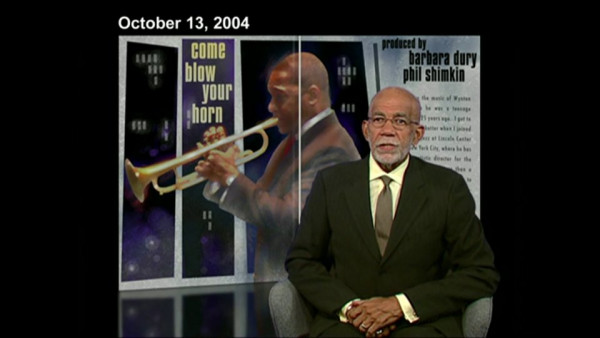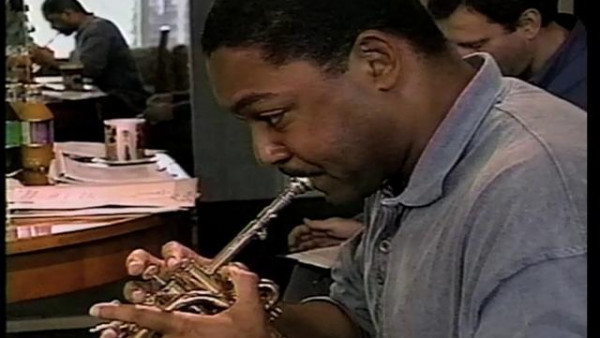Ed Bradely interviews Wynton for CBS’s 60 Minutes 2004
Interview Transcription:
For more than a decade, Jazz at Lincoln Center has been trying to build a new home for jazz, a theater tailored to this unique art form.
Now, what had been a dream for musician and artistic director Wynton Marsalis is about to become reality. And he tells Correspondent Ed Bradley it’s proof that jazz is not, as many critics have charged, struggling to survive.
“It’s [Jazz] so great as an art form. It presents such great challenges to artists that it will ensure its own survival,” says Marsalis.
Next week, Marsalis and his Jazz at Lincoln Center Orchestra will move into their new home — three performance venues in New York’s new Time Warner Center. It’s a kind of space jazz has never had.
The Allen Room, which seats 600 people, looks out on one of the most spectacular views in the world. The view may be a distraction, but Marsalis says, “that’s why we have to play better.”
And he says there’s no better place to play than Rose Hall, a 1,200-seat room that is the first concert hall built specifically for jazz. Marsalis, who has tested the room out with his horn a few times, says, “I’m ecstatic about it.”
The idea for jazz to have its very own home began more than a decade ago. It became a reality in 1998 when New York City gave Jazz at Lincoln Center a huge performance space inside the soon-to-be constructed Time Warner Center.
“I’ll always use the analogy and say we are like some people who are from the backwoods of Mississippi somewhere that inherit a mansion in the north,” says Marsalis. “So, you know, you can get the mansion, but how are you gonna get the lights on?”
Getting those lights turned on was more than they bargained for.
“The building was supposed to cost about $45 million or $50 million,” says Marsalis. “We started to lay out what we wanted in the hall. When we got finished laying out everything, it wasn’t just gonna be one space, but had to be three spaces, and the pricetag went up quite a bit. So it ended on $128 [million].”
He says nothing close to this has ever been spent on jazz before. But some critics might have preferred it that way. Purists say it will be impossible to create that small-club feeling that’s at the heart of jazz. One even described the space as “jazz in a shopping mall.”
“Jazz takes place everywhere. To think that jazz is only in one place, that jazz can only be in a basement club, Benny Goodman did his Carnegie Hall concert in 1938,” says Marsalis. “This is 2004. So to think that our music has to be always relegated to less than what it is, it occupies a very large space in the landscape of the American mythology.”
And it’s a landscape Marsalis knows very well. He was 6 years old when he got his first trumpet from the bandleader Al Hirt, a friend of his father Ellis, who is a pianist and taught his sons music. Wynton, his brother Branford, and the other brothers took the lessons to heart. In 1995, when Bradley first sat down with Marsalis for an interview with 60 Minutes, Marsalis told him about the musical influence his father had on him.
“I can still remember, you know, stuff that he would practice [singing] that’s just a little exercise he would do. And that sound is always in music,” said Marsalis.
So are the sounds he heard growing up in Kenner, La. “My mom used to always tell us this story that we were both sitting in a car and the train was going past,” recalled Marsalis. “And she said – and Branford looked over and he said, ‘The train is going woo, woo, woo.’ I said, ‘No, the train is going kanook-kanook, kanook-kanook.’”
That childhood train took Marsalis first to the New Orleans Philharmonic, where he made his debut at the age of 14. In 1979, he went on to New York’s prestigious Juilliard School, where he studied jazz until he got a chance for an advanced degree, playing with the great Art Blakey’s band.
When 60 Minutes first met Marsalis, he was on the road 300 days a year. He was always a dedicated student of jazz, and he never missed an opportunity to pass on what he learned.
But some called the Wynton Marsalis view of jazz old-fashioned, and others criticized him for overlooking the achievements of white jazz composers.
Is jazz primarily an African-American music form?
“Jazz was invented by the Afro-American. But an art form is not the province of any people,” says Marsalis. “Like Beethoven’s music is Beethoven’s music, it’s Germanic music. But they can’t say, ‘That’s our music.’ If you can take something, take Beethoven’s music and do something with it, it’s yours. That’s how art works.”
Marsalis took Beethoven’s music, and Bach’s and Hayden’s, and did something with it. In 1983, he became the first to win Grammys for jazz and classical music in the same year. And then in 1997, at the age of 35, Marsalis became the first and only jazz artist to win a Pulitzer Prize. His composition, “Blood on the Fields,” was a jazz opera, focusing on the tragedy of slavery in America.
Did his life change after he won a Pulitzer? “No. You still hit that jump shot,” says Marsalis, laughing. “It doesn’t change, man. It doesn’t.”
In many ways, he’s still the kid from Kenner, La. If there’s anything Marsalis loves playing as much as jazz, he says it’s basketball.
Today, at the age of 42, Marsalis is still on the road nearly 300 days each year, not just playing jazz, but fund-raising for the new center.
“This year has been hard for me. Just the amount of work,” says Marsalis. “But the rewards for this type of work are so great that you get energy.”
Some have suggested that the young lion who burst on the scene at the age of 20 may now be at a crossroads in his life. “They still card me. When I go into places to get a drink, they still ask me for ID. You know my life has not played out that way,” says Marsalis. “I love the music. And I continue to play it.”
“Some of the guys in the band call you the old man,” Bradley tells Marsalis, laughing.
“They called me the old man. But you know, they’ve been calling me the old man since I was in my 30s,” says Marsalis.
Although Marsalis has never married, he has three sons — 16, 14 and 8 years old. Did they all try to play basketball? “My oldest son, no. My second son plays ball,” says Marsalis, laughing. “He just told me, matter of fact, that he’s not going to play me again because he really doesn’t want to beat me.”
Are all three of them musically inclined? “All of them play instruments. But I don’t think they’ll be musicians,” says Marsalis.
Marsalis says he’s not old enough yet to turn 43. But how would he like to be remembered?
“I want to be remembered as the person with the greatest jump shot of any music educator over 42,” says Marsalis. “That’s what I want.”
Source: CBS


